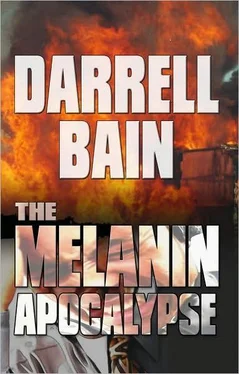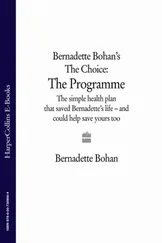Darrell Bain
THE MELANIN APOCALYPSE
To all the oppressed people of the world, anywhere and anywhen. It is my sincerest hope that the events portrayed in this novel never happen.
…Scientists have declared that in ten years they will succeed in creating a radically new type of biological weapon. This weapon would be capable of infecting people according to a genetically predetermined marker such as skin color or eye shape. Infection could have a delayed effect or only begin once a certain type of medicine was taken. A recent closed seminar held by the CIA….
…the most terrifying new possibility is the hypothetical biological weapon that could infect people according to genetic markers. Not only would it allow for genocide; it would be created specifically for that purpose. A recent report by the British Medical Association stated that “the rapid progress in genetics could become the basis for ethnic cleansing on an unheard of scale in the near future.
Excerpts from article in
Gateway to Russia , March 2004 by Vasili Sychev
On his hospital bed in the city of Port Harcourt, Nigeria, Benjamin Imhonde barely had the energy to raise his arm, but that was enough to see that his skin was becoming lighter. Several weeks ago it had been ebony black. Now it was several shades paler. He wouldn’t have minded so much except that as his skin color faded, he became sicker… and sicker. Benjamin made an effort and turned his head toward the bed next to him where his wife lay sleeping, exhausted from expending what little energy she had left in the simple act of using the bedpan. She had cried out weakly from the pain caused by her movements, but now she was silent.
Sleeping? No ! She looked more like… He didn’t want to think what she looked like. He tried to raise his head but a wave of pain coursing through his body dropped it back to the pillow. A tear leaked from Benjamin’s right eye, then another, and one from his left. He felt them trickling down his face and tried to rein in his emotions. Even crying hurt now. I’m going to die , he thought . I’ve known ever since they moved us to the isolation ward . But no one would tell him what kind of disease he and his wife had!
Just before the transfer, he overheard talk that the sickness was sweeping through the city of Port Harcourt. Then an orderly told him yesterday—or was it the day before?—that only blacks were becoming ill, and even more ominous, that no one was recovering. That bit of information had been bought from the orderly, but Benjamin didn’t mind; he could afford it. He was even willing to pay for more, but the orderly never returned.
Benjamin Imhonde tried one more time to move, to stretch his hand out toward the body of his wife. His arm barely twitched. That was his last conscious movement. An hour later the orderlies came to remove the bodies. They were Catholic nuns. They were white. They showed no symptoms of illness.
* * *
Doug Craddock took a seat at the conference table in the administrative building of the Center for Disease Control in Atlanta, Georgia. He nodded to the others present and smiled across the table at Amelia Foster. He had been with the scientist-physician once before on a mission, to the Congo where a pesky, previously unknown virus had popped up, then disappeared just as suddenly. Amelia’s presence meant they must have a puzzle on their hands. She was CDC’s top specialist in infectious diseases; they didn’t send her just anywhere. He also knew Robert Handley, the man in charge of logistics and a good friend. The other person was new to him, a small attractive woman with light brown hair who looked to be in her thirties.
Amelia saw him looking and realized her oversight. “Doug, I’m sorry. This is June Spencer. She’ll be head nurse on this little jaunt. June, Doug Craddock, in charge of our security detail. It was becoming almost routine for the CDC to send a security contingent along with the scientists and health workers when it was called on to investigate disease hotspots these days. There was even a new building going up next to the CDC complex, to be devoted to security.
“Hi,” Doug said, smiling at her. The nurse gave a very slight nod in return, without a smile. He diagnosed her problem almost immediately. Another one who thinks the world would be better off without guns—until the bullets start flying in their direction, then we’re the first ones they call for.
Amelia tapped her fingernails on the table to get everyone’s attention again. “There’s coffee and tea for those who want it. Now that everyone’s here, let’s get started.”
Doug had been the last one to arrive. He poured coffee for himself while Amelia played with the keyboard at her place. The wall screen swam into focus. It showed a map of a large part of western Africa.
“Here’s where we’ll be going.” An arrow moved over the map. It stopped at Port Harcourt, Nigeria. “As you can see, we’ll be in Nigeria, near the coast. Port Harcourt is a relatively modern city so facilities should be adequate.
“And here’s what we’re investigating.” The next image showed the body of a pale black man. His skin had a peculiar hue, as if some of the color had been scrubbed off with a rough cloth. Other than that, there were no signs of illness—yet he was obviously dead.
“What is it?” June asked.
“Good question. We don’t know; that’s why we’re being sent. The disease starts with a tingling felt over the whole body and progresses over a period of weeks to extreme myalgia, neuralgia, intractable pain and death. The good news is that it doesn’t appear to be contagious through airborne droplets, as diseases like the flu are. The bad news is that it’s spreading anyway and the medical people don’t know why.”
Doug rubbed his chin where a five o’clock shadow was forming. He had a beard that showed more gray than did his wavy, dark brown hair, though his hair was beginning to be shot with white threads, too. To him, the new disease already sounded ominous, but then these days any unexplained phenomenon that caused death worried him. Damned terrorists.
Amelia continued. “We’ve already received specimens from some of the afflicted. So far, we haven’t turned up what’s causing the illness, though we’re beginning to suspect a peculiar little enterovirus that resembles the poliovirus species.”
“Polio? I thought we had wiped it out,” Doug said.
“I didn’t say it was the polio virus; just that it resembles it in certain ways. We’ll have to wait and see what the virologists say. In the meantime, our job is to go there and assist in finding and identifying the vector.”
“Any clues yet?” June Spencer asked. She and her team would be the ones having the most direct contact with patients. She played with a pendant at her neck, an odd arrangement of diamonds and gold, rolling it between thumb and fingers.
Amelia hesitated, as if reluctant to speak. “Well… possibly. For some reason, it’s only people of color that have become ill. That’s rather peculiar considering what a cosmopolitan city Port Harcourt is.”
The other three people in the room couldn’t help it. Their eyes turned toward Bob Handley, whose skin was a rich brown color, bordering on black.
He ignored the stares. “Maybe it only strikes those carrying the genes for Sickle Cell,” Handley shrugged. “Or maybe it’s an all black neighborhood where the vector popped up.”
“It doesn’t matter right now,” Amelia said. She brushed a tress of her blond hair away from her forehead.
Doug smiled inwardly, remembering a dream he had of running his fingers through that same tumble of blond hair. Amelia was a few years older than he and had an appealing, rather than pretty face. He had thought idly about asking her out now that he was getting over Doris’ death, but doubted he would.
Читать дальше

![Nick Cracknell - The Quiet Apocalypse [= Island Zero]](/books/28041/nick-cracknell-the-quiet-apocalypse-island-zero-thumb.webp)










